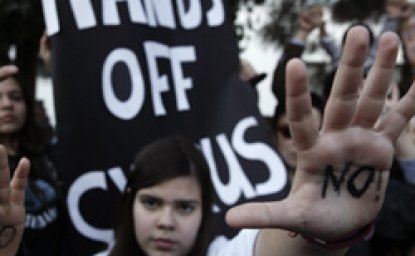The Kremlin’s initial outrage over developments in Cyprus – and the island’s shocking expropriation of billions of dollars held by Russian companies and citizens – has given way to mild indifference. “If somebody gets caught and loses money at the two largest [Cypriot] banks, it’s a shame,” First Deputy Prime Minister Igor Shuvalov recently stated, “but the Russian government isn’t going to do anything about it.”
It turns out that the European Union settlement that left Cyprus’s banking sector in shambles has done Moscow a big favor. Not only did the EU take down a major offshore banking center, it helped President Vladimir Putin’s campaign to return to Russia any money stashed away in offshore bank accounts.
This seemingly technical financial issue also reveals a potential sea change in the rules of the game for Russian business. Instead of seeking shelter abroad, Russian companies and financiers may finally have a stake in fighting to protect their money at home.
Putin had first talked about his policy of “de-offshorization” in a December 2012 state-of-the-nation speech. He criticized the lack of transparency of offshore tax havens and complained that Russian companies were escaping domestic law by selecting foreign jurisdictions to settle commercial disputes.
Within two months, Putin proposed a ban on government officials from holding overseas bank accounts and owning foreign-issued stocks or bonds. This draft legislation was followed by an April 2 decree requiring that government employees submit reports on income and expenditures to the presidential administration by the beginning of July including all information regarding foreign bank accounts, securities and property. The Russian media immediately speculated that several government officials would resign before this July deadline.
Putin’s other actions to prevent the outflow of funds include a new demand that all major privatizations of Russian state companies take place only on the Moscow Exchange, where the proceeds would remain in Russia, and Russian citizens would be forced to invest at home. A Russian commercial court also recently issued a far-reaching decision requiring offshore companies to reveal corporate information if subject to Russian law and litigation--something most offshore entities seek to avoid.
Prime Minister Dmitry Medvedev even hinted that Moscow was considering its own offshore zone in the Far East--though this proposal immediately brought back memories of the last time Russia created domestic tax havens. Mikhail Khodorkovsky, the former Russian oligarch now in prison, used various internal “tax optimization” schemes that provided little legal defense when he was first prosecuted for tax evasion.
Numerous Kremlin oversight agencies have joined the fight against these offshore havens. Rosfinmonitoring, the Russian agency charged with fighting money laundering and investigating suspicious transactions, has long been perceived as having significant access to confidential banking information, which could be used as leverage over Russians sending money abroad.
The chairman of the Russian Investigative Committee, Alexander Bastrykin, however, recently complained that Rosfinmonitoring lacked certain basic investigative authority. Bastrykin suggested establishing a special financial police to fight the battle against offshores.
Meanwhile, the prosecutor’s office has been busy signing agreements with several prominent offshore zones including Luxembourg, Sri Lanka and the Dominican Republic to ensure enhanced cooperation and the exchange of information. Putin has also given the presidential administration and his longtime ally, Sergei Ivanov, the authority to review all declarations of foreign assets. This gives the executive branch access to – and significant discretion over – financial data related to the use of offshore accounts by Russian government officials.
Any aggressive public scrutiny of offshore holdings could undoubtedly cause great anxiety among the Russian elite. A recent report revealed the names of several prominent Russians, including the wife of Deputy Prime Minister Igor Shuvalov, as owners of offshore companies in the British Virgin Islands.
Russia also stands to lose significant foreign investment if global transactions are subject exclusively to Russian jurisdiction and if all major privatizations take place on the Moscow Exchange.
Many countries share Russia’s disdain for offshore banking centers, viewing them as sites for money laundering, tax avoidance and capital flight. Moreover, the plugging of one leak – in this case, Cyprus – simply redirects these licit and illicit money flows to other offshore tax havens. So the struggle is by no means over.
But for Moscow, the prospect of stemming--though probably not eliminating--the flight of Russian money carries extra significance that considerably raises the stakes in any long-term battle against offshore havens.
Putin’s call for de-offshorization is reviving a 20-year debate about property rights in Russia. As Andrei Babitskii, the editor of Esquire Russia, recently commented in the Russian business newspaper Vedomosti, private individuals have a choice: They can fight for the establishment of the “rules of the game” in their own house or they can change their place of residence.
Since the collapse of the Soviet Union, Russian oligarchs and companies have seemed content to rely on offshore tax havens to protect their wealth--as opposed to advocating for a similar sense of security in Russia. Putin’s campaign against offshore zones and his effort to have money returned could bring about a major change in the way Russians conduct business.
The nation’s leading business representatives may soon learn that the struggle to defend property rights often means a more zealous defense of one’s civil rights as well.
This article first appeared on Reuters The Great Debate.





